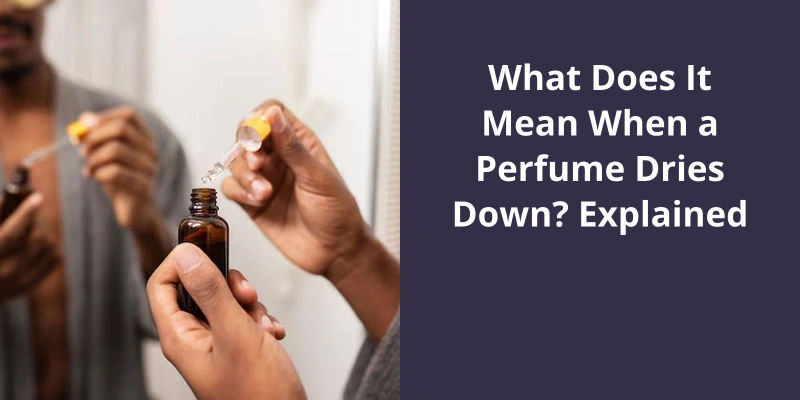“When a perfume dries down” refers to the final stage of fragrance’s evaporation on your skin. After applying a perfume, the aroma evolves and changes over time due to the slow disappearance of top notes, which are the initial burst of scent. Following the top notes, the middle or heart notes become apparent, and finally, you smell the base notes during the dry down phase. This process can take a few hours, during which the smell might change significantly. The dry down is crucial as it’s the longest-lasting scent, powered mainly by deeper, heavier ingredients such as musks, vanilla or woods.

What Is the Dry Down of a Fragrance?
When it comes to fragrances, one important aspect to consider is the dry down. This refers to the final phase of a fragrance that appears several hours after application. During this stage, the base notes of the fragrance become more apparent and the scent develops further. This is what ultimately creates the unique character of the fragrance that people smell throughout the day.
This is where the top and middle notes begin to fade away and the base notes take center stage. This can sometimes mean that the fragrance initially smells one way when first applied but changes to something completely different a few hours later. This is why it’s important to test a fragrance for several hours before deciding whether or not it’s the right scent for you.
These fragrances typically have very tenacious base notes that stick around for many hours after application. This is why some people may notice that their perfume lingers on their skin or clothing for days after they”ve worn it. Other fragrances are designed to have a shorter dry down time, meaning that the scent fades away more quickly.
The Science Behind Fragrance Dry Down and the Chemical Reactions That Occur
Fragrance dry down is the process by which a perfume’s scent changes over time on the skin. This is due to chemical reactions between the fragrance compounds and the individual’s body chemistry. The science behind fragrance dry down involves a complex interplay of chemical reactions, which are affected by factors such as temperature, skin type, and the fragrance’s specific composition. Studying these reactions can help perfumers create scents that last longer and have more complex olfactory profiles.
So, while you may think that the perfume you just spritzed isn’t for you based on the initial scent, it’s important to give it time to fully develop on your skin and experience each layer. In this article, we’ll delve deeper into the process of a perfume’s dry down and why it’s important to be patient when trying out new scents.
How Long Does a Perfume Dry Down?
This is where the true personality of the fragrance is revealed. It’s the last stage of the perfume when the scent reaches it’s true potential, and all of the ingredients have fully developed. The scent transforms as it dries down, and in some cases, the dry down can be so different from the first spray that you might not even recognize it as the same perfume.
The reason for this transformation lies in the nature of perfume. Perfume consists of a combination of top, middle, and base notes, each serving a different purpose. When you first spray a perfume, you smell the top notes, which are designed to be attention-grabbing and provide an initial burst of freshness. They’re usually citrusy or floral, and evaporate the fastest.
After the top notes have dissipated, you”ll begin to smell the heart notes, which make up the core of the fragrance. These notes last longer than the top notes and help to establish the overall character of the scent. They’re often floral or spicy, and are intended to create a sense of harmony with the top notes.
It’s only after the heart notes have had a chance to settle that the base notes become noticeable. These notes provide a strong foundation for the fragrance and are responsible for it’s staying power. They’re usually woody, musky, or amber-based, and can last on the skin for several hours after the other notes have faded.
So, when you’re trying out a new perfume, don’t judge it too quickly. Wait for the dry down and see how it evolves. If you think the fragrance smells too strong or overpowering at first, give it some time. It might be that the dry down is exactly what you’re looking for, and the fragrance just needs time to settle and reveal it’s true character.
How to Properly Store Your Perfumes to Maintain Their Longevity and Prevent Changes in Dry Down Over Time.
- Store perfumes in a cool and dry place away from direct sunlight and heat sources.
- Avoid storing perfumes in humid or moist environments, such as bathrooms or kitchens.
- Keep perfumes in their original bottles and boxes to protect them from air exposure.
- Don’t shake perfume bottles unnecessarily as it can cause changes in the fragrance composition.
- Use perfumes within their recommended shelf life to ensure optimal fragrance quality.
- Consider investing in a fragrance refrigerator or cooler to keep your perfumes in pristine condition.
- Label your perfumes with purchase date and open date to keep track of their shelf life.
- Avoid displaying perfumes in areas with strong odors, such as kitchens or laundry rooms.
Perfume is a popular way to express oneself and create a memorable impression. While you might be tempted to hoard and safeguard your perfume collection, it’s crucial to understand that the fragrance’s quality and longevity can diminish over time. Despite it’s sealed packaging and high price tag, perfume isn’t immune to external factors that can deteriorate it’s scent. The big question is, can perfume dry out? Let’s dive deeper into this topic.
Can Perfume Dry Out?
Perfume, like any liquid, is made up of molecules that are constantly moving and interacting. When the bottle is opened, some of these molecules escape into the surrounding air, while others stay in the liquid. Over time, the concentration of fragrance in the bottle decreases, and the scent becomes weaker. This process is called evaporation, and it’s the same reason why a wet towel dries out or a glass of water left out in the sun disappears.
The rate of evaporation depends on several factors, including the temperature, humidity, and the size and shape of the opening in the perfume bottle. High temperatures and low humidity can speed up the evaporation process, while a small opening can slow it down. This is why it’s important to store perfume in a cool, dry place away from direct sunlight and to keep the bottle tightly sealed when not in use.
If youve noticed that your perfume is drying out, there are a few things you can do to slow down the process. One option is to transfer the fragrance to a smaller bottle with a smaller opening. This will reduce the amount of air that comes into contact with the fragrance and slow down the evaporation. Another option is to store the perfume in the refrigerator, which will keep it cool and slow down the chemical reactions that cause evaporation.
It’s also important to be aware that certain ingredients in perfume can evaporate more quickly than others. Top notes, which are the initial scents that you smell when you first apply the perfume, tend to evaporate faster than middle and base notes, which are the underlying scents that last longer.
While it’s natural for perfume to dry out over time, there are steps you can take to slow down the process and extend the life of your favorite fragrance.
How to Properly Apply and Wear Perfume to Maximize It’s Longevity
To properly apply and wear perfume for maximum longevity, spray it on pulse points such as wrists, neck, and behind ears after showering or moisturizing. Avoid rubbing the scent into the skin as it can shorten it’s lifespan. Also, consider layering the fragrance by using a matching lotion or body wash. Finally, don’t over-apply as it can quickly become overpowering and unpleasant.
Source: How to prevent a perfume from evaporating from a glass …
Now that we know that perfume marks on clothes are a common problem, it’s important to understand how to remove them effectively. Fortunately, most perfume marks can be removed with standard washing procedures. However, it’s important to note that there are some tips and tricks that can help ensure that the perfume mark is removed completely without damaging the fabric of the garment. In this article, we’ll explore some of the most effective methods for removing perfume marks from your clothing.
Does Perfume Wash Out of Clothes?
Perfumes can make your clothes smell good, but it doesn’t always end well. Sometimes it can leave marks on your favorite clothing articles. Whether it’s an accidental spritz or a leaky bottle, perfume marks can be frustrating to deal with. Thankfully, in most cases, it’s easy to get perfume out of clothes with a few tricks.
If you do notice perfume marks on your clothes, don’t panic. The first thing to do is to rinse the affected area with cold water immediately. This helps prevent the perfume from permanently setting into the fabric. It’s important that you don’t use hot water as it can make the stain more difficult to remove later on in the washing process.
It’s essential that you avoid using bleach or any bleaching agents on the stained clothing as they could cause additional damage to the fabric. If you find that the perfume smell lingers on after washing, then you could try an enzymatic cleaner or soak the item in a mixture of white vinegar and water.
In such instances, a prewash with a stain removing agent could come in handy. Let it sit for a few minutes before washing the article normally. Also keep in mind that how you dry your clothes could also influence whether or not perfume marks would come out. If you notice any remaining marks, don’t dry the item in the dryer. Instead, let it air dry and then repeat the washing process.
Common Mistakes to Avoid When Trying to Remove Perfume Stains
- Applying hot water to the stain
- Using bleach or other harsh cleaning agents
- Allowing the stain to dry before attempting to remove it
- Scrubbing too vigorously at the stain, which can spread it
- Not testing a cleaning solution on an inconspicuous area first
- Applying too much pressure when blotting the stain
- Not using the proper cleaning solution for the type of fabric
In order to preserve the quality of your perfume, it’s important to know how to store it properly. While some may believe that leaving the perfume without a cap can enhance it’s fragrance, this is actually a misconception that can negatively impact your perfume. In this article, we’ll explore why leaving perfume without a cap is a bad idea, and how to properly store your fragrance to maintain it’s quality and longevity.
Is It Bad to Leave Perfume Without Cap?
Exposure to air and sunlight can significantly alter the chemical composition of perfume, leading to a change in the scent profile and affecting it’s longevity. As a result, you may find that your perfume smells different and even loses it’s potency over time. This is especially true for fragrances that contain volatile oils, which can easily evaporate when exposed to air.
Moreover, leaving perfume without it’s cap can also expose it to dust, dirt, and other particles that can contaminate the fragrance and alter it’s aroma. Even small amounts of these external elements can significantly disrupt the balance of the perfume, leading to an off scent that you may not enjoy. Additionally, exposing perfume to high temperatures can also hasten the deterioration process, leading to a decline in scent quality.
It’s also important to note that perfume is an expensive and delicate product that requires proper care and storage to ensure it’s longevity. Leaving the bottle open can lead to wastage of the perfume, as the scent will evaporate more quickly than if the cap was in place. This can also lead to additional costs as you may need to purchase a new bottle more frequently.
It’s essential to store perfume in a cool, dark, and dry place with the cap tightly secured. By doing so, you can prolong the life of your perfume and enjoy your favorite scent for an extended period. Remember, a little care goes a long way in preserving the quality of your perfume!
Conclusion
This is the ultimate destination of the fragrance, where it finally settles into it’s true character and lasting impression. A well-executed dry down is a hallmark of a quality perfume, and it’s a testament to the perfume maker's art and creativity.





